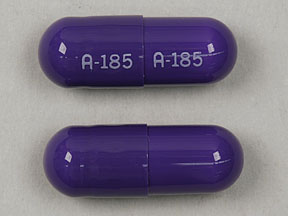Trimethobenzamide (oral/injection)
Generic name: trimethobenzamide (oral/injection) [ trye-METH-oh-BENZ-a-mide ]
Brand names: Tigan, Ticon, Benzacot
Dosage forms: intramuscular solution (100 mg/mL), oral capsule (300 mg)
Drug class: Anticholinergic antiemetics
What is trimethobenzamide?
Trimethobenzamide is used to treat nausea and vomiting related to surgery or caused by stomach flu.
Trimethobenzamide may also be used for purposes not listed in this medication guide.
Trimethobenzamide side effects
Get emergency medical help if you have signs of an allergic reaction: hives; difficult breathing; swelling of your face, lips, tongue, or throat.
Stop taking trimethobenzamide and call your doctor at once if you have:
-
twitching or uncontrollable movements of your eyes, lips, tongue, face, arms, or legs;
-
trouble speaking or swallowing;
-
problems with thought or memory;
-
pain, stiffness, or unusual muscle spasm in your neck;
-
tremors, feeling restless or being unable to sit still;
-
jaundice (yellowing of the skin or eyes);
-
a seizure (convulsions); or
-
low blood cell counts--fever, chills, tiredness, mouth sores, skin sores, easy bruising, unusual bleeding, pale skin, cold hands and feet, feeling light-headed or short of breath.
Serious side effects may be more likely in older adults.
Common side effects of trimethobenzamide may include:
-
headache, muscle cramps;
-
dizziness, drowsiness;
-
confusion, depressed mood;
-
blurred vision;
-
diarrhea; or
-
pain, stinging, burning, redness, or swelling where the medicine was injected.
This is not a complete list of side effects and others may occur. Call your doctor for medical advice about side effects. You may report side effects to FDA at 1-800-FDA-1088.
Related/similar drugs
Warnings
Follow all directions on your medicine label and package. Tell each of your healthcare providers about all your medical conditions, allergies, and all medicines you use.
Before taking this medicine
You should not use trimethobenzamide if you are allergic to it.
Tell your doctor if you have ever had:
-
liver disease; or
-
kidney disease.
Do not give this medication to a child or teenager without medical advice, especially if the child has a fever, flu symptoms, or chicken pox.
It is not known whether trimethobenzamide will harm an unborn baby. Tell your doctor if you are pregnant.
It may not be safe to breast-feed while using trimethobenzamide. Ask your doctor about any risk.
How should I take trimethobenzamide?
Follow all directions on your prescription label and read all medication guides or instruction sheets. Your doctor may occasionally change your dose. Use the medicine exactly as directed.
Trimethobenzamide is usually taken 3 or 4 times per day. Follow your doctor's dosing instructions very carefully.
Trimethobenzamide oral is taken by mouth. Trimethobenzamide injection is injected into a muscle by a healthcare provider.
Store at room temperature away from moisture and heat.
Trimethobenzamide dosing information
Usual Adult Dose for Nausea/Vomiting:
Oral: 300 mg orally 3 or 4 times a day
IM Injection: 200 mg IM 3 or 4 times a day
Comment: Dosage should be adjusted according to the therapy indication, symptom severity, and patient response.
Uses:
-Treatment of postoperative nausea and vomiting
-Treatment of nausea associated with gastroenteritis
What happens if I miss a dose?
Since trimethobenzamide is used when needed, you may not be on a dosing schedule. Skip any missed dose if it's almost time for your next dose. Do not use two doses at one time.
What happens if I overdose?
Seek emergency medical attention or call the Poison Help line at 1-800-222-1222.
What should I avoid while using trimethobenzamide?
Avoid driving or hazardous activity until you know how trimethobenzamide will affect you. Your reactions could be impaired.
Drinking alcohol with this medicine can cause side effects.
Do not share this medicine with another person, even if they have the same symptoms you have.
What other drugs will affect trimethobenzamide?
Using trimethobenzamide with other drugs that make you drowsy can worsen this effect. Ask your doctor before using opioid medication, a sleeping pill, a muscle relaxer, or medicine for anxiety or seizures.
Other drugs may affect trimethobenzamide, including prescription and over-the-counter medicines, vitamins, and herbal products. Tell your doctor about all your current medicines and any medicine you start or stop using.
More about trimethobenzamide
- Check interactions
- Compare alternatives
- Pricing & coupons
- Reviews (14)
- Drug images
- Side effects
- Dosage information
- During pregnancy
- Drug class: anticholinergic antiemetics
- Breastfeeding
- En español
Patient resources
- Trimethobenzamide (Intramuscular) advanced reading
- Trimethobenzamide (Oral) (Advanced Reading)
- Trimethobenzamide Capsules
Other brands
Professional resources
Other brands
Related treatment guides
Further information
Remember, keep this and all other medicines out of the reach of children, never share your medicines with others, and use this medication only for the indication prescribed.
Always consult your healthcare provider to ensure the information displayed on this page applies to your personal circumstances.
Copyright 1996-2025 Cerner Multum, Inc. Version: 12.01.

